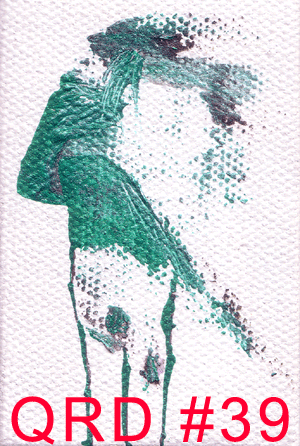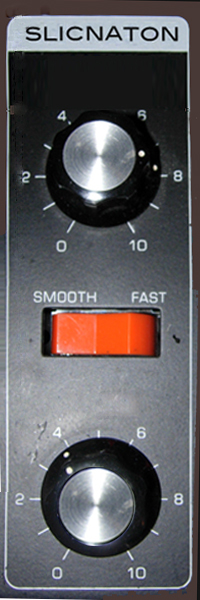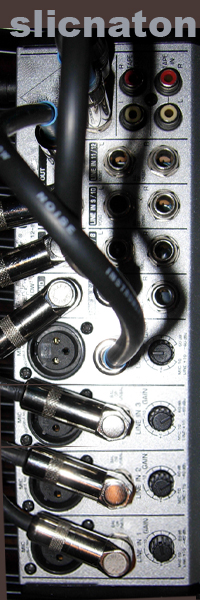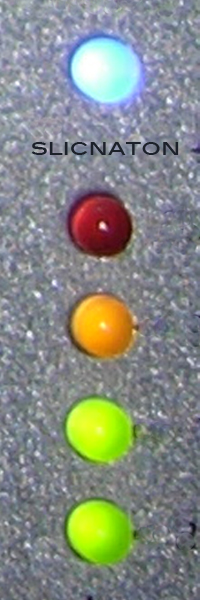
| about
this issue
interviews with: Nicholas Slaton of slicnaton Sarah June Northern Valentine Hotel Hotel Brian John Mitchell of Silber Melissa Spence Gardner of XO Lisa Uber of WRSU |
 |
 |
 |
 |
 |
 |
 |
|
|
 |
|
|

March 2009



Nic – Instrumental dark ambient music which regularly features horns, reeds, & strings with live electronics & looping. Somewhere between contemporary composition, European free improvisation, & live electronics. Other appropriate terms could be EAI or Electro-Acoustic Improvisation or Post-Genre Improvisation.
QRD – You were classically trained with an upright bass performance degree. How do you feel this training has helped or hindered you as a performer & musician?
Nic – Well, not completely true. I did go to music school, but my degree is in jazz performance. Of course, I studied classical music as well, however this is a little different than being born & bred as a “classical” musician. In addition to playing bass all the time, I learned theory, history, & how to have a broad point of reference when interpreting music as well as the understanding of how to quickly decipher new sounds. Going to school gave me a certain level of confidence when walking into new playing situations.
QRD – For several years you’ve made a lot of your money as a hired gun in traditional jazz & rock bands. How did you get interested in more avant-garde stuff?
Nic – I was looking for something that was more “me.” I asked myself, “If you had a sound what would it be like?” I had to find something I liked. This was scary! I realized I didn’t like many of the things I was hearing, they were technically amazing & impressive but I felt disconnected & I had to search for something else. When I found music I did like, it turned out to be depressingly obscure: electro-acoustic improvisation & contemporary composition.
QRD – With slicnaton you run a dual career between jazz composition & no-input mixing/glitch. How does one affect the other?
Nic – I’m not so sure they’re that far apart. My trio music is basically strings & winds run through my electronics setup. Along with the melody & form, I write out whatever I want to sample into the composition. In many of the songs I sample the other instruments, which I can use to provide accompaniment to a later melody or section & of course I can loop or manipulate the samples. When I play solo, & I’m doing glitch/no-input, I also sample passages & trigger them as loops. When these samples are replayed (being somewhat familiar) they can act as motifs or melodic content. What I am trying to say is the composed aspect & the electronic aspect of what I do are co-inspired by each other. I have to write the sample sections to fit within the constraints of my equipment & this affects the type of parts I might write. Also, many of the no-input sounds can be similar to a bowed string, so sometimes it becomes hard to tell who is playing what. At some point the instrumentation dissolves & you’re left with just sounds.
QRD – What exactly is “no input?”
Nic
– Well, here’s what some other people say it is...
“No
Input is a form of music where artists use samplers or other electronic
devices, such as sound mixers and play them without exterior sources of
sound.Instead the outputs of the devices are plugged into the inputs, creating
a closed electronic feedback circuit.”
- Scanning of Modulations: Condition
#12
“The
no-input mixer is based on feedback. How can I explain... It's like
sculpture. You shape the feedback into music. It's very hard to control
it. The slightest thing can change the sound. It's unpredictable and uncontrollable.
Which makes it challenging. But, in a sense, it's because of the challenges
that I play it. I'm not interested in playing music that has no risk.”
- Toshimaru Nakamura
“The
no-input mixer, a mixing board which does not use any external inputs,
but where all sounds are created through internal feedbacks.”
- Marco Ciciliani
Nic – I know better than to answer that question! I will say I think there is a problem in using the term “Jazz” to describe such a large body of music. It becomes different for everybody. When I hear the word “Jazz” I think of Coleman Hawkins or Joe Williams, when you hear “Jazz” you think of Ornette or Sun Ra. There is a large gap between these opinions yet both are correct. Some people think of the hotel lounge or even spirit fingers, so there are lots of different definitions the term.
QRD – Do you prefer playing upright or electric bass & why?
Nic – It’s two different beasts. I just like having the right instrument for the music I’m playing at the time. I don’t like playing upright in a rock band & I don’t like walking bass lines on electric. Whatever sounds best & gets the job done.
QRD – You switch up what pedals you’re using for your glitch stuff a lot. How do you decide what to use, what is integral to your rig, & what would you like to add?
Nic- Well, I’m limited by how much I want to carry to the gig, but I do keep it simple on purpose. People look at my rig & they’re like “where is the sound coming from?” I like being limited because it forces you to use the items at hand. Whatever sound comes out is what I’m going with. I usually use 3-4 pedals & an amp when I perform. I almost always bring a sampler & a mini mixer. Most of the pedals I use have a defect or misuse, which is pleasing to me, but I switch it up so I don’t ever get comfortable.
QRD – Your no-input set is generally really short (15-20 minutes); do you think more musicians should follow this time constraint?
Nic – I just stop when the song is over. I guess I should consider playing a 2nd song sometimes. If people liked it, there are discs available!
QRD – You’re pretty big on wanting the difference between work for hire & musical collaboration being clearly defined when recording music. How do people react to you saying they’re playing something you wrote & won’t have songwriting credit?
Nic – Nobody likes hearing that... but everyone takes the check. I like things to be clearly defined at the beginning so everyone agrees on who owns what & I can move the project forward with confidence. Most people agree that if I’ve written a song, I have a chart, a demo recording, I’m not asking you to make up a part just to play what’s written & I’m going to pay you, then the copyrights should belong to me. Where it starts to get interesting is when the group is improvising or writing together. For projects that are collaborations we split all writing credits equally. It’s not that people expect writing credit, but they seem to look at me funny when I pull out papers for them to sign. Even after we go over everything & they understand what it is & why, they just kind of shrug & say “whatever.” But it’s never really been a problem. From a label/publisher perspective, you have to protect your investments from future copyright claims, even when it “doesn't seem to matter.” The reality is that copyright infringement cases are common. It is also common practice to wait until someone makes money before bringing up that you cowrote that song or it was a collaboration.
QRD – Why did you feel the need to start your own record label & do you plan to keep it oriented to releasing your own material?
Nic – At the time I didn't see any other way to get the music out, I didn’t know any labels who would be interested. Now that I know the business a little better & I’ve got my foot in the door so to speak, I plan to work with other artists. I’ve just started a new label called Extemporate. This will give me an opportunity to work with similarly minded artists in the fields of electronic, improvised, & experimental music. I have received some demos I think people would really like to hear, it’s just a matter of working out the details. Extemporate has several releases scheduled for 2009. The first will be an album from Polish vitarist Meitek Glinkowski, Black-Scholes. It has Ian Davis on drum kit & myself on basses & electronics. I will also be releasing slicnaton titles from Extemporate.
QRD – Why do you still feel CDs are relevant with the clear rise of importance of digital downloads?
Nic – As technology gets better digital may win out, but discs & vinyl sound better & can become tangible fetish objects. People still buy music. The dead “industry” is exactly that. The people who were making tons of money but weren’t musicians are falling fast. They’ve been replaced by smaller hard working labels & musicians who self-release. When indy artists connect with a fan base, they sell records. No fans = No sales.
QRD – Do you think the music you write out as a score is more serious or important than your improvisational work?
Nic – No.
QRD – Your “noise” music often seems more musical than most work in the genre, what do you attribute this to?
Nic – Thank you. When I perform “no-input & glitch music” I start each set without any pre-recorded samples. This means whatever noises I can generate with my equipment becomes the sounds I use as building blocks for my performance. I just try to find something quickly & then let it develop in its own direction. Once you start you are kind of at the mercy of the music gods, it can go wherever & you have to be willing to go there. Sometimes it’s just amazing & sometimes it’s hard to listen to, but improvising like that always makes me feel really alive.
QRD – When you’re writing a scored piece of music, do you generally write using piano or bass to put it together?
Nic – Both, I write at the piano for chords or to get the concept of the whole piece, but for melodies I use bass.
QRD – You have your own recording studio. How important to you is it that you be your own engineer?
Nic – I can’t afford to have an engineer hang out with me all day. Plus I can get the sounds I want without having to verbalize what I want to someone. But, if I had my way I would have an engineer when I am tracking. This would allow me to just be a musician in the studio. I would still mix my own records, but I would prefer someone else record me.
QRD – You give lessons for upright bass. What are some things you try to teach that you doubt other teachers would?
Nic – The students I have had who have been the most happy were learning theory. It sounds boring, but this is the stuff musicians want to know. “How do I know which notes to play?” or, “ How do I identify this chord?” People want to know how to sound better quickly & playing the right notes is a good start.
QRD – You have a ton of musical projects, do you want to go over what they are & how they differ?
Nic – Here is a small list of my current projects & some of the original music groups I have been associated with in the past:
QRD – What are your plans for the rest of 2009?
Nic – I’m about to have a baby girl (any day now), so I will be busy at home. We are very excited! I am also planning on moving into a new facility in late 2009, so we are preparing for that.
QRD – Anything else?
Nic – I think that covers it.
Links:
slicnaton
on Facebook
Other QRD interviews with
slicnaton:
Father's
Day interview with Nicholas Slaton of slicnaton (June 2009)
